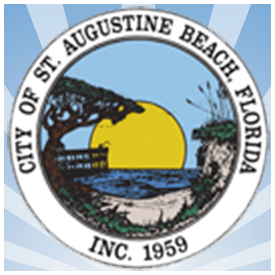
The City of St. Augustine Beach is asking Historic City News readers to join them in taking steps to improve the quality of its surface waters by reducing the amount of pollution carried to the waterways by stormwater runoff.
Stormwater is the rain that falls refreshing our rivers and waterways. It is absorbed into the ground, then filters down to replenish our underground aquafer. Impervious roads, driveways, and parking lots, made of concrete or asphalt, are the natural consequence of real estate development. The stormwater that can no longer be absorbed is known as “runoff”.
Catch basins and storm drains, collect the “stormwater runoff” and channel it through a network of underground pipes to the City’s Mizell Road retention pond, making up our stormwater system.
In a perfect world, the grey water could be easily recycled. Unfortunately, a variety of toxic pollutants are washed from the streets and parking lots into storm drains. These pollutants include: leaking oil, antifreeze, and gasoline from motor vehicles; copper dust, which is released from motor vehicle brake pad linings; rubber tire dust; soaps and chemicals used to wash motor vehicles; waste motor oil from vehicles, lawn mowers, and small equipment; and fertilizers, pesticides, and insecticides, and they can make it back into our waterways, and ultimately to the Intracoastal Waterway.
This type of pollution is called “non-point source pollution” since it comes from many unidentifiable sources making it hard to regulate and prevent.
Stormwater pollution has a significant effect on surface waters and is a major problem in cities all over the country.
How you can help:
- The best way to reduce stormwater pollution is to stop it at its source. Keep your storm drains clean and free of debris. Remember that pollutants flushed down storm drains directly affects the quality of our waterways and could possibly make them unsafe for boating, fishing, swimming, and other water related activities.
- Don’t work on your car in a place where oil and grease could be washed into street gutters. Used motor oil should be contained and taken to a collection center. Most automotive shops provide this service.
- Grass clippings should be bagged and disposed of with yard waste. Dumping grass clippings down a storm drain can slow stormwater flow and clog the drains.
- Do not wash dirty paint brushes under an outdoor faucet. Chances are the dirty rinse water will flow into a storm drain and into our waterways. Water-based paints and oil-based paints should be left in the original paint can and be discarded with special pickup on Wednesdays (Please note – one must call Public Works, 904-471-1119, to arrange a special pickup.)
- Pet dropping should not be discarded into storm drains or left in the yard. Clean up pet droppings and dispose of them in the garden, trash bins, or in the toilet.
- When washing your vehicle, park on grass or some other area that can absorb the runoff water. Washing your car on the street sends all the chemicals used to clean your car into a catch basin and directly into our water.
- Use pesticides sparingly and don’t fertilize right before it rains.
- Dumping waste down storm drains is not only bad for the environment, it is illegal too. If you have questions or a complaint, please call the City of St. Augustine Beach Public Works Department at 904-471-1119, or email Pu**********@*******ab.org.
Discover more from HISTORIC CITY NEWS
Subscribe to get the latest posts sent to your email.




